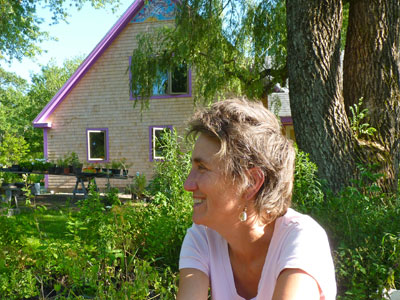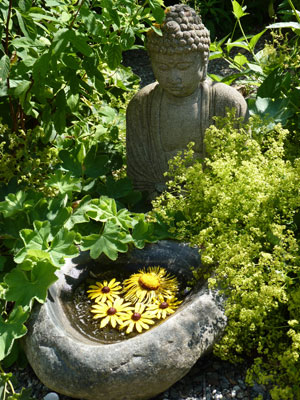 |
| Deb Soule of Avena Botanicals in front of the new building at the herbal business. English photo. |
By Jean English
Over nearly three decades, Avena Botanicals in Rockport, Maine, steadily has grown a 3-acre garden, a business and a reputation for quality herbal products – teas, tinctures, salves and more – all from 1,000 pounds of fresh, hand-harvested herbs.
In the past year, that growth has taken a couple of giant leaps.
Certified Biodynamic
In 2011, after adhering to biodynamic practices for 16 years, Avena became the first Maine farm to be certified as biodynamic by Demeter USA.
As with organic agriculture, creating and maintaining fertile soil without using toxic synthetic chemicals is fundamental to biodynamic agriculture, which may build plant and soil health with compost, green manures, cover crops, crop rotations, companion plants and mulch.
The difference “is in the spiritual realm,” says Avena owner Deb Soule. “The biodynamic system of farming relates the ecology of the earth to the larger cosmos” and “views the soil and farm as living organisms, and places significant attention on soil health.”
Biodynamic growers apply certain preparations to plants, soils and compost piles, with timing following the natural rhythms of the day, the seasons, the moon and planets. Biodynamic founder Rudolph Steiner taught that regular use of these preparations “would help garden soils be more open and receptive to receiving the spiritual impulses radiating from the cosmic forces,” says Soule. “He also believed that the vitality of the food and herbs we ingest, revitalized by the use of the biodynamic preparations, would help humans be more fully conscious, more spiritually awake, more aware of the divine energy present in all of life.”
 |
| A peaceful scene in Avena’s herb garden. English photo. |
Steiner’s ideas were influenced by his early life in rural Austria, where people followed the rhythms of nature and relied upon herbal medicine for healing.
Soule doesn’t try to explain biodynamic principles scientifically but says the practice seems to have brought added vitality to her plants, soil and farm.
“It’s a much more holistic way, looking at the farm as a whole organism,” she says.
She finds it interesting that the six compost preparations used in biodynamics are all from medicinal plants.
“Biodynamic preparations and philosophy resonated with me as an herbalist,” says Soule. “Taking good care of ourselves is a daily practice. Biodynamics is daily observation of what’s going on in the garden. There is a spirit in every medicinal plant that is part of the healing practice. Biodynamics is a practice of helping to heal the earth and humanity.”
Soule had reservations when USDA took over organic standards, but she values the high standards set by MOFGA Certification Services.
“I’ve been certified organic for 27 years and have had such good experiences,” she says.
“I decided to become certified biodynamic because I wanted to be connected to the growing number of certified biodynamic farmers in the United States, and to be with people who haven’t been bought out,” as some organic enterprises have.
To become certified as biodynamic, a farm first has to be certified-organic, and “you have to first be a really good organic farmer,” says Soule. A farm must support diverse plant life and must leave areas for pollinators, for example.
She spends about two days each year preparing paperwork for MOFGA’s certification, and another two to three days working on biodynamic certification.
The tranquil beauty of Avena’s tree, shrub and herb garden reflects this dedication. “There is a real intention of creating a healing space for people and pollinators,” says Soule.
That beauty is enhanced by the constant hum of bees, the not uncommon darting of hummingbirds, the ubiquitous, peaceful butterflies. The health and abundance of pollinators is one of Soule’s special interests – including potential benefits of herbal constituents on the health of bees.
Regulatory Rigmarole
Avena’s second big leap began seven years ago, when the USDA and FDA created new regulations for all herb businesses, large and small. Soule spent the last five years working to comply with these – including adding a 3,000-square-foot building.
Through Maine’s Farms for the Future program, Soule wrote a detailed business plan for the required building. A grant provided partial funding toward the structure, and the Finance Authority of Maine loaned her the rest.
Among the new requirements is a separate receiving room where plants are brought before they go into production; a certified kitchen with a hand sink, dishwasher and a three-bin sink for preparing quantities of herbal products; a room for storing products; another for storing samples for seven years of each batch of tincture made; a packaging and shipping room and an office. Visitors can buy herbal products at a small store on site.
“I spent four years putting together notebooks with specific information about every plant we process, getting the paperwork to FDA standards” says Soule.
The Herbal Classroom and Clinic
Payments on the building loan, added to a pre-existing mortgage on the original property, have stretched Avena’s finances seriously, yet Soule still donates hours of time to visitors through Avena’s Herbal Classroom.
The Herbal Classroom, Avena’s non-profit, 501c(3) educational arm, offers classes to individuals and health care providers in herbal medicine, Ayurveda, and biodynamic and organic herb gardening. One goal of the nonprofit is to start a year-long biodynamic training program in 2014. Students learn in Avena’s garden, in an octagonal classroom, and in an herbal classroom and clinic in the new building. Every summer, Soule leads free garden walks to visitors on half a dozen Wednesday afternoons.
“With current studies showing that 36 percent of people living in the United States use medicinal herbs, the demand for locally grown herbs and herbal training courses is growing,” says Soule. Hence she started the clinic with two herbalists and a doctor.
Avena’s gardens are open weekdays from noon to 5 p.m., from May through September, and its shop is open on weekdays from noon to 5 p.m. year-round. For more information and for ordering online, see www.avenabotanicals.com. And look for Avena in the Agricultural Products Area of the Common Ground Country Fair.
